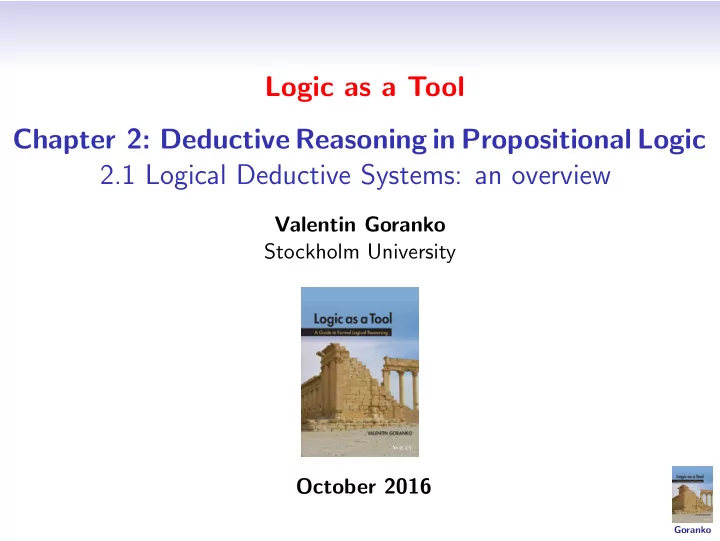

Logic as a Tool Chapter 2: Deductive Reasoning in Propositional Logic 2.1 Logical Deductive Systems: an overview Valentin Goranko Stockholm University October 2016 Goranko
Deductive systems • Logical consequence: A 1 , . . . , A n � C and logical validity: � C are semantic notions, referring to the meaning of the formulae. • Deductive systems are meant to capture logical consequence and validity defined by the logical semantics, in terms of deductions (derivations). • A deduction is a completely mechanical procedure, not referring to the meaning of the occurring formulae. • In deductive systems logical consequence is replaced by deductive consequence and valid formulae (tautologies) – by derivable formulae (theorems). Goranko
Basic ingredients of a deductive system • Formal logical language. Formulae. • Axioms. Rules of inference. • Inference (deduction, derivation) from a set of assumptions (premisses) in a deductive system D : A 1 , . . . , A n ⊢ D C . • In particular, formulae derivable from no assumptions are called theorems of D : ⊢ D C . Goranko
Soundness and completeness of a deductive system A deductive system D is sound (correct) for a given logical semantics if D can only derive what is logically correct (valid), i.e.: A 1 , . . . , A n ⊢ D C = ⇒ A 1 , . . . , A n � C In particular: = ⊢ D C ⇒ � C A deductive system D is complete for a given logical semantics if D can derive every valid logical consequence, i.e.: A 1 , . . . , A n � C = ⇒ A 1 , . . . , A n ⊢ D C In particular: � C = ⇒ ⊢ D C A deductive system D is adequate for a given semantics if it is both sound and complete for it, i.e.: A 1 , . . . , A n � C A 1 , . . . , A n ⊢ D C ⇐ ⇒ In particular: ⇒ ⊢ D C . � C ⇐ Goranko
Main types of classical deductive systems • Axiomatic systems • Natural deduction • Semantic tableaux • Sequent calculi • Resolution Goranko
Recommend
More recommend